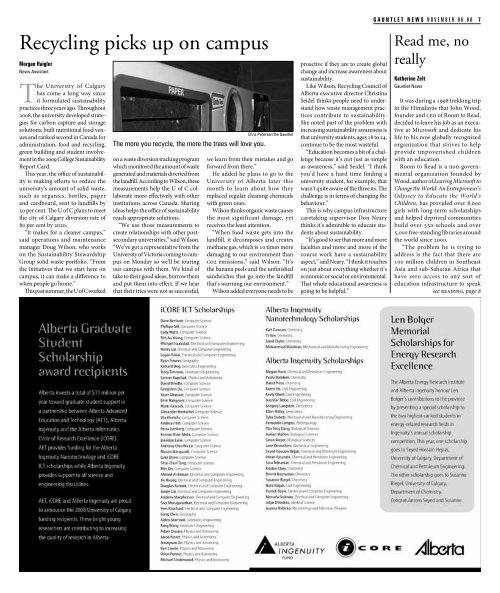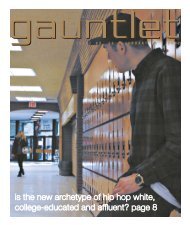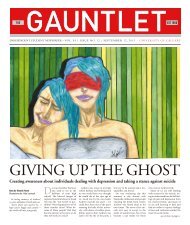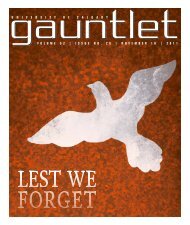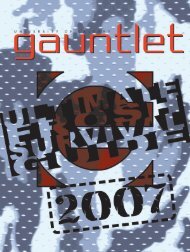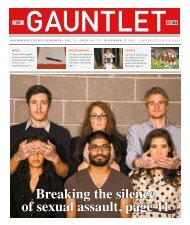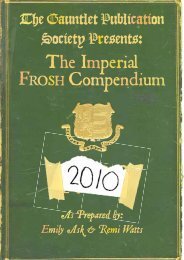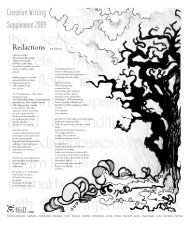Create successful ePaper yourself
Turn your PDF publications into a flip-book with our unique Google optimized e-Paper software.
GAUNTLET NEWS NOVEMBER 06.08 7<br />
Recycling picks up on campus<br />
Morgan Haigler<br />
News Assistant<br />
<strong>The</strong> University of Calgary<br />
has come a long way since<br />
it formulated sustainability<br />
practices three years ago. Throughout<br />
2008, the university developed strategies<br />
for carbon capture and storage<br />
solutions, built nutritional food venues<br />
and ranked second in Canada for<br />
administration, food and recycling,<br />
green building and student involvement<br />
in the 2009 College Sustainability<br />
Report Card.<br />
This year, the office of sustainability<br />
is making efforts to reduce the<br />
university’s amount of solid waste,<br />
such as organics, bottles, paper<br />
and cardboard, sent to landfills by<br />
50 per cent. <strong>The</strong> U of C plans to meet<br />
the city of Calgary diversion rate of<br />
80 per cent by 2020.<br />
“It makes for a cleaner campus,”<br />
said operations and maintenance<br />
manager Doug Wilson, who works<br />
on the Sustainability Stewardship<br />
Group solid waste portfolio. “From<br />
the initiatives that we start here on<br />
campus, it can make a difference to<br />
when people go home.”<br />
This past summer, the U of C worked<br />
<strong>The</strong> more you recycle, the more the trees will love you.<br />
on a waste diversion tracking program<br />
which monitored the amount of waste<br />
generated and materials diverted from<br />
the landfill. According to Wilson, these<br />
measurements help the U of C collaborate<br />
more effectively with other<br />
institutions across Canada. Sharing<br />
ideas helps the office of sustainability<br />
reach appropriate solutions.<br />
“We use those measurements to<br />
create relationships with other postsecondary<br />
universities,” said Wilson.<br />
“We’ve got a representative from the<br />
University of Victoria coming to campus<br />
on Monday so we’ll be touring<br />
our campus with them. We kind of<br />
take to their good ideas, borrow them<br />
and put them into effect. If we hear<br />
that their tries were not as successful,<br />
Chris Pedersen/the <strong>Gauntlet</strong><br />
we learn from their mistakes and go<br />
forward from there.”<br />
He added he plans to go to the<br />
University of Alberta later this<br />
month to learn about how they<br />
replaced regular cleaning chemicals<br />
with green ones.<br />
Wilson thinks organic waste causes<br />
the most significant damage, yet<br />
receives the least attention.<br />
“When food waste gets into the<br />
landfill, it decomposes and creates<br />
methane gas, which is 10 times more<br />
damaging to our environment than<br />
CO2 emissions,” said Wilson. “It’s<br />
the banana peels and the unfinished<br />
sandwiches that go into the landfill<br />
that’s warming our environment.”<br />
Wilson added everyone needs to be<br />
proactive if they are to create global<br />
change and increase awareness about<br />
sustainability.<br />
Like Wilson, Recycling Council of<br />
Alberta executive director Christina<br />
Seidel thinks people need to understand<br />
how waste management practices<br />
contribute to sustainability.<br />
She noted part of the problem with<br />
increasing sustainability awareness is<br />
that university students, ages 18 to 24,<br />
continue to be the most wasteful.<br />
“Education becomes a bit of a challenge<br />
because it’s not just as simple<br />
as awareness,” said Seidel. “I think<br />
you’d have a hard time finding a<br />
university student, for example, that<br />
wasn’t quite aware of the three Rs. <strong>The</strong><br />
challenge is in terms of changing the<br />
behaviour.”<br />
This is why campus infrastructure<br />
caretaking supervisor Don Neary<br />
thinks it’s admirable to educate students<br />
about sustainability.<br />
“It’s good to see that more and more<br />
faculties and more and more of the<br />
course work have a sustainability<br />
aspect,” said Neary. “I think it touches<br />
on just about everything whether it’s<br />
economic or social or environmental.<br />
That whole educational awareness is<br />
going to be helpful.”<br />
Read me, no<br />
really<br />
Katherine Zelt<br />
<strong>Gauntlet</strong> News<br />
It was during a 1998 trekking trip<br />
in the Himalayas that John Wood,<br />
founder and CEO of Room to Read,<br />
decided to leave his job as an executive<br />
at Microsoft and dedicate his<br />
life to his now globally recognized<br />
organization that strives to help<br />
provide impoverished children<br />
with an education.<br />
Room to Read is a non-governmental<br />
organization founded by<br />
Wood, author of Leaving Microsoft to<br />
Change the World: An Entrepreneur’s<br />
Odyssey to Educate the World’s<br />
Children, has provided over 8,000<br />
girls with long-term scholarships<br />
and helped deprived communities<br />
build over 550 schools and over<br />
5,000 free-standing libraries around<br />
the world since 2000.<br />
“<strong>The</strong> problem he is trying to<br />
address is the fact that there are<br />
100 million children in Southeast<br />
Asia and sub-Saharan Africa that<br />
have zero access to any sort of<br />
education infrastructure to speak<br />
see Reading, page 8


